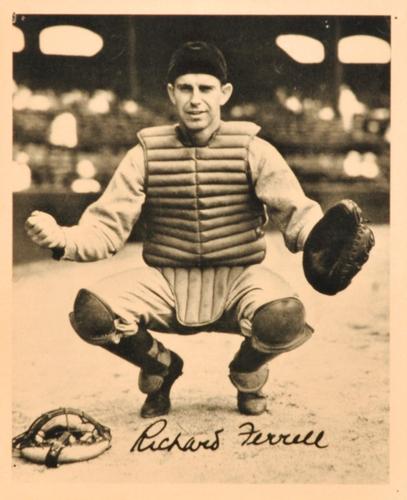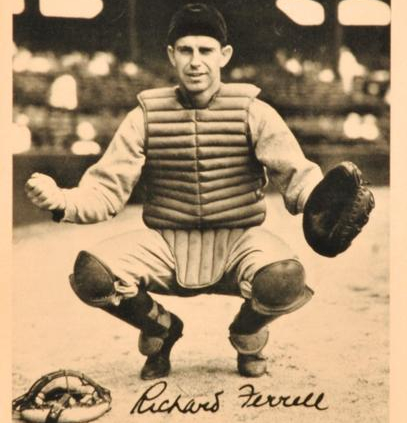July 19, 1933: Rick Ferrell homers off brother Wes, who also homers, in Cleveland’s 13-inning win
 When Boston Red Sox catcher Rick Ferrell hit a home run off his younger brother Wes on July 19, 1933, he was an unlikely batter to homer off the Cleveland Indians ace, since he had hit only nine home runs in five major-league seasons. In fact, Wes was more of a home-run threat than Rick, which he demonstrated by smashing a round-tripper in the same game, an 8-7, 13-inning win for Wes’s Indians over Rick’s Red Sox.
When Boston Red Sox catcher Rick Ferrell hit a home run off his younger brother Wes on July 19, 1933, he was an unlikely batter to homer off the Cleveland Indians ace, since he had hit only nine home runs in five major-league seasons. In fact, Wes was more of a home-run threat than Rick, which he demonstrated by smashing a round-tripper in the same game, an 8-7, 13-inning win for Wes’s Indians over Rick’s Red Sox.
The game at Fenway Park attracted only 3,000 fans on a Wednesday afternoon. Perhaps it was because the Red Sox hadn’t provided much to cheer about, as they were in seventh place, 19 games behind the first-place New York Yankees. Cleveland was only marginally better, in sixth place, 15 games behind.
Cleveland had fired manager Roger Peckinpaugh on June 9, replacing him with one of his closest friends, Walter Johnson, the former stellar pitcher of the Washington Nationals for 21 years and their manager from 1929 to 1932. Red Sox player-manager Marty McManus was in his second season with Boston.
Johnson went with 25-year-old right-hander Wes Ferrell as his starting pitcher. Suffering from a shoulder ailment, Ferrell was in the midst of his worst season to that point in his career. He had lost his last five decisions in six appearances, with opposing teams posting a hefty slash line of .323/.394/.433. Prior to 1933, Ferrell had won at least 20 games in four straight seasons.
McManus started Hank Johnson, an eight-year veteran right-hander who had been traded to the Red Sox by the Yankees in 1932. Johnson was 6-6 with a 4.01 ERA coming into the game.
Johnson and Ferrell had little trouble through the first two innings. In the second, Wes issued a walk to his 27-year-old brother, Rick, who had been traded from the St. Louis Browns to Boston on May 9. Rick, batting fifth for the Red Sox, had 7 hits in 33 previous plate appearances against his brother.
In the top of the third, Hank Johnson gave up a single to Bill Knickerbocker and walked Wes Ferrell. Dick Porter then hit a single that scored Knickerbocker and sent Ferrell to third. Porter advanced to second on Milt Galatzer’s fly to left, and Harley Boss’s double scored Ferrell and Porter to make it 3-0.
Johnson yielded two more runs in the top of the fourth. He walked Bill Cissell, who scored on Wes Ferrell’s home run to left field, his third of the season. As Wes rounded the bases, he was all smiles and gave his brother a laugh as he crossed the plate.1 Rick Ferrell, who finished his career as a .280 hitter, was no stranger to hitting home runs. It was his 15th major-league homer.
Wes Ferrell took the 5-0 Indians lead to the bottom of the fourth, but Dusty Cooke led off with a single and Wes walked Roy Johnson. Rick Ferrell hit a three-run home run to left field, only the 10th of his career.
While Rick circled the bases, a temperamental Wes kicked the ball that umpire George Moriarty threw out onto the field.2 It was only the second time since 1900 that an American or National League player had homered off his brother; Cleveland’s George Stovall hit a round-tripper against brother Jesse of the Detroit Tigers on October 7, 1904.3
Neither team scored in the fifth or sixth inning. Johnny Welch, who relieved Hank Johnson in the fifth, retired all six batters in those two innings, striking out the side in the sixth.
The tables turned on Welch in the top of the seventh. After retiring leadoff batter Knickerbocker on a groundball, he gave up successive singles to Wes Ferrell, Porter, Galatzer, Boss, and Earl Averill, producing two runs and pushing the Indians’ lead to 7-3.
In the bottom of the seventh, it was Wes Ferrell’s turn to struggle on the mound. Bucky Walters led off with a single but was forced out on Welch’s groundball to second. Rabbit Warstler followed with a walk. The Red Sox picked up the second out when third baseman Odell Hale fielded McManus’s grounder and got the force on Walters at second.
But Cooke’s single scored Welch and sent McManus to second. Roy Johnson – the 1933 Red Sox lineup’s leader in batting average, home runs, RBIs, and OPS – smacked a double to right that scored McManus and Cooke, cutting the deficit to 7-6. Wes Ferrell was replaced by Sarge Connally, who struck out Rick Ferrell to end the inning.
McManus looked to his bench in the bottom of the ninth to try to salvage the game. Johnny Gooch, who pinch-hit for Welch, popped out to lead off the inning. Johnny Hodapp hit for Warstler and walked. McManus went to his reserves a third time by inserting Billy Werber as a pinch-runner for Warstler.
Following McManus’s fly out to center, Connally faced Cooke, who had already singled three times. Cooke walked, setting up cleanup hitter Roy Johnson with the potential tying run on second. Johnson delivered a single to score Werber, which evened the score, 7-7. Willis Hudlin was summoned to stop the Red Sox rally, but he walked Rick Ferrell to load the bases. Smead Jolley hit a weak grounder that catcher Frankie Pytlak fielded and threw to first, retiring the side and stranding three runners on base.
Boston put runners on second base in the 10th and 12th innings but was unable to push a run across the plate.
Right-hander Bob Kline replaced Welch for the Red Sox in the top of the 10th and did an admirable job holding the Indians at bay until the 13th. Cissell drew a walk to lead off the inning. Boston first baseman Bob Seeds fielded Knickerbocker’s sacrifice in plenty of time to get the out at first, but his throw to McManus at the bag sailed over the second baseman’s head and into foul territory. Cissell scored the go-ahead run on the error,4 and Knickerbocker ended up on third base. Lefty Bob Weiland, who had started in his last four appearances, was brought in to squelch any further runs. After Clint Brown struck out, Knickerbocker was thrown out at home trying to steal. Porter flied out to end the inning.
Brown easily dispatched all three Red Sox batters in the bottom half of the inning to cinch the Indians’ win, 8-7. The Indians made it a three-game sweep over Boston, including a 14-inning win in the series opener on July 16.
Brown claimed his seventh win of the season, yielding only one hit in his three innings. Kline was charged with his third loss.
Both Ferrell brothers provided significant contributions to their respective teams’ offense. In addition to his homer, Wes also had a single and a walk, scored three runs, and had two RBIs, while Rick drove in three runs with his home run and also collected a single and two walks. It was the first time in AL history that brothers had homered in the same game.5
Cooke led the Red Sox with three hits and Roy Johnson drove in three runs with a double and a single. On the Indians’ side, Porter and Boss led with three hits apiece. Boss also led with three RBIs.
Over the course of his career, Rick Ferrell faced his brother in 48 plate appearances, producing 12 hits. The home run was one of four extra-base hits. Rick batted .286 and never struck out against his brother.
Rick Ferrell became a Hall of Fame catcher, although not in the mold of much later Hall of Fame catchers like Yogi Berra, Johnny Bench, and Mike Piazza, all of whom were known for their powerful bats. Rick collected only 28 home runs during his 18-year career.
Wes Ferrell outpaced his brother with a total of 38 home runs during his 15-year career. As of 2024, Negro Leagues player Bullet Rogan holds the major-league record for most home runs by a pitcher (50). Wes Ferrell leads all AL and NL pitchers, closely followed by Bob Lemon (37) and Warren Spahn (35).6
Since Rick Ferrell’s home run against Wes Ferrell in 1933, only two more AL and NL players have hit home runs against their brothers. Joe Niekro of the Houston Astros homered off his brother Phil of the Atlanta Braves in May 1976, and Cleveland’s Bradley Zimmer homered against brother Kyle of the Kansas City Royals in September 2021.7
Acknowledgments
This article was fact-checked by Joseph Wancho and copy-edited by Len Levin.
Sources
In addition to the sources cited in the Notes, the author consulted Baseball-Reference.com and Retrosheet.org for pertinent information, including the box score and play-by-play. He also reviewed the following newspaper coverage:
Cobbledick, Gordon. “Indians Land Series Finale in 13th, 8-7,” Cleveland Plain Dealer, July 20, 1933: 17.
Whitman, Burt. “Indians Edge Sox in 13th, 8-7, in Melodramatic Series Finale; Ferrell Brothers Hit Home Runs,” Boston Herald, July 20, 1933: 20.
https://www.baseball-reference.com/boxes/BOS/BOS193307190.shtml.
https://www.retrosheet.org/boxesetc/1933/B07190BOS1933.htm.
Photo credit: Rick Ferrell, Trading Card Database.
Notes
1 James O’Leary, “Three-Base Heave Beats Sox, 8-7; Wes Ferrell Batted From Box in Seventh by Boston,” Boston Globe, July 20, 1933: 19.
2 “Live Tips and Topics,” Boston Globe, July 20, 1933: 18.
3 Shanna McCarriston, “Cleveland’s Bradley Zimmer Becomes First MLB Hitter to Homer Against Brother Since 1975,” September 27, 2021, https://www.cbssports.com/mlb/news/clevelands-bradley-zimmer-becomes-first-mlb-hitter-to-homer-against-brother-since-1975/.
4 O’Leary.
5 The only brothers who had homered in a National League game before the Ferrells were Paul and Lloyd Waner of the Pittsburgh Pirates in September 1927 and June 1929. “Brothers Homering in the Same Game,” Retrosheet.org, https://retrosheet.org/Research/VincentD/Brothers%20HR%20in%20Same%20Game.pdf. Accessed September 30, 2024.
6 BR Bullpen, “MLB All-Time Leaders in Home Runs by Pitcher,” Baseball-Reference.com, https://www.baseball-reference.com/bullpen/MLB_all-time_leaders_in_home_runs_by_pitchers. Accessed July 27, 2024.
7 McCarriston, “Cleveland’s Bradley Zimmer Becomes First MLB Hitter to Homer Against Brother Since 1975.”
Additional Stats
Cleveland Indians 8
Boston Red Sox 7
Fenway Park
Boston, MA
Box Score + PBP:
Corrections? Additions?
If you can help us improve this game story, contact us.


